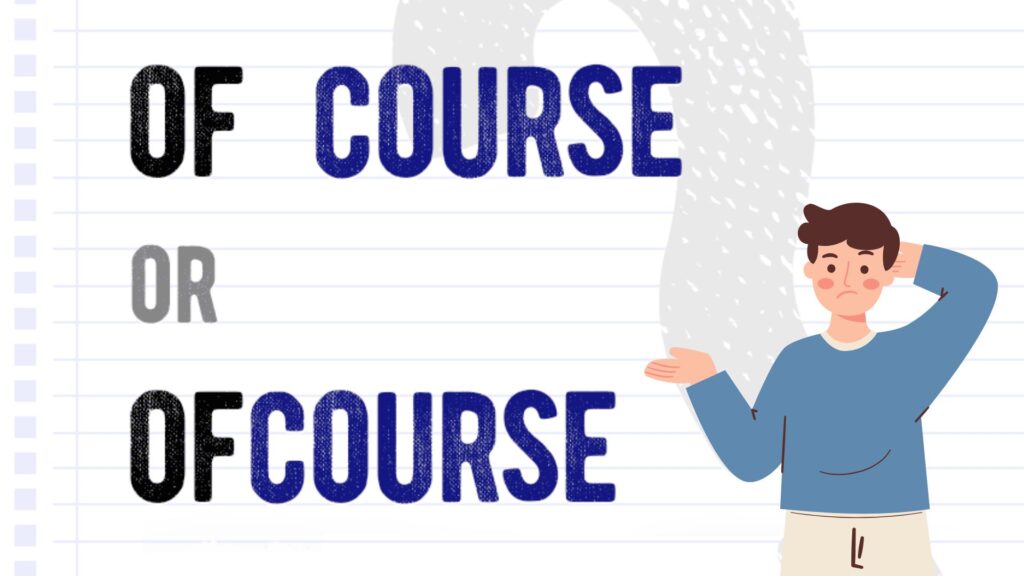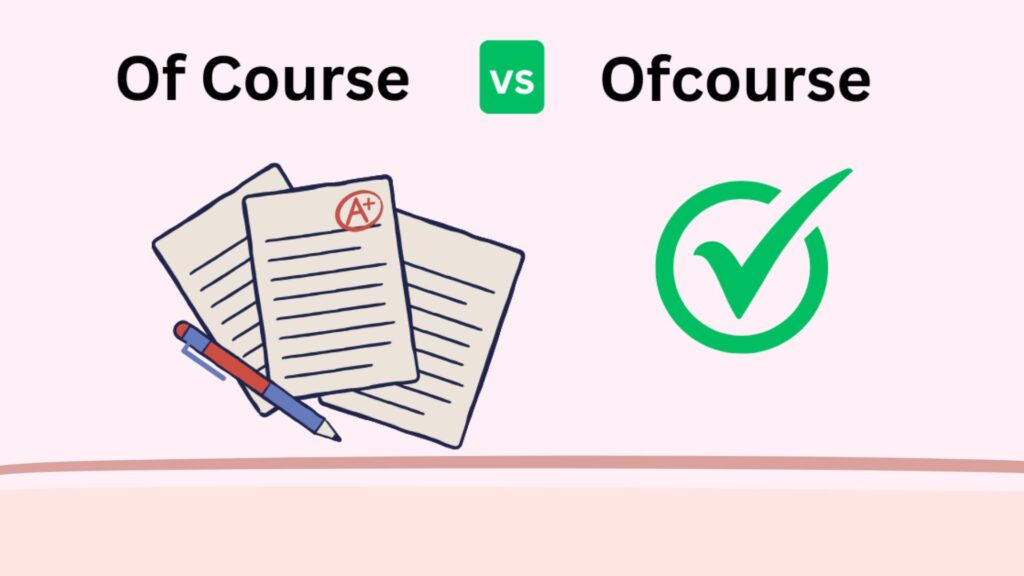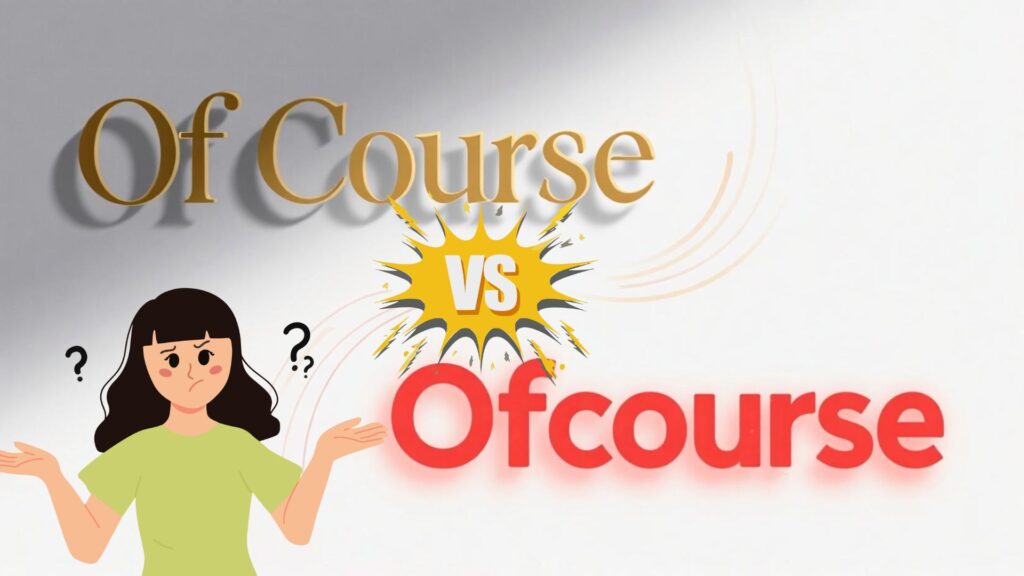Have you ever typed out a quick response and thought, “Is it of course or ofcourse?” You’re not alone! This tiny phrase causes a big confusion in English writing. Both forms look believable, and if you go by how they sound, they seem the same. But the truth is, only one is correct.
In this guide, we’ll break down the correct spelling of of course, why ofcourse is wrong, and how to use this phrase properly in your emails, messages, and formal writing. We’ll even show you examples of of course in sentences, plus some synonyms to keep your writing fresh.
Of Course or Ofcourse – Which Is Correct?

Let’s start with the golden rule: the correct spelling is of course two separate words.
The single word form ofcourse is a misspelling of of course and is not recognized in any standard English dictionary. If you want to write correctly, always separate the two words.
Here’s why:
- Of = a preposition
- Course = a noun
Together, they form a phrase meaning certainly or naturally. But they never combine into one word.
Why People Confuse “Of Course” and “Ofcourse”
English can be tricky because pronunciation often influences spelling mistakes. When you speak, of course sounds like a single unit, so people assume it’s written that way too. Add to that the fact that English has compound words like notebook or website, and you can see why people think ofcourse might be acceptable.
Another source of confusion? The phrase off course, which means something completely different. Let’s clear that up:
- Of course = definitely, naturally (Of course, I’ll help you.)
- Off course = not on the intended path (The ship went off course during the storm.)
Offcourse written as one word is also incorrect.
Meaning and Usage of “Of Course”
So, what does of course mean? It’s an expression of certainty or agreement. People use it to:
- Show something is obvious: Of course, that’s the right answer.
- Give polite permission: Of course you can borrow my book.
- Express strong affirmation: “Are you coming?” Of course!
Examples of Of Course in Sentences
- Of course, I’ll send you the details later today.
- You’re welcome to join, of course.
- Can I take the day off? Of course!
Notice how the phrase softens responses and makes them sound polite and confident.
Scenario Examples in Professional and Everyday Writing
Email Example 1 – Formal Response
Subject: Assistance with Data Review
Email Body:
Hi Daniel,
Thank you for your email. Of course, I’d be happy to review the data before Friday. Please share the files by tomorrow so I can allocate enough time.
Best regards,
Melissa
Email Example 2 – Customer Support
Subject: Address Update Confirmation
Email Body:
Dear Mr. Green,
Thank you for reaching out. Of course, we can update your address in our system. Please allow 24 hours for the change to reflect.
Kind regards,
Emily
Customer Service Team
Text Conversation
Friend: “Hey, are you coming to Sarah’s party tonight?”
Reply: Of course! Wouldn’t miss it.
How to Write “Of Course” Correctly
When in doubt, remember this:
- ✅ Of course (two words) is always correct.
- ❌ Ofcourse (one word) is incorrect and considered a spelling error.
Even though it looks small, using the wrong form in an email to your boss or a client can make your writing look unpolished.
Bulleted Rules with Do’s and Don’ts
Do’s
- Do write of course in both formal and informal writing.
- Do capitalize it at the start of a sentence: Of course, that’s fine.
- Do use it to express certainty or agreement politely.
Don’ts
- Don’t write ofcourse in emails, reports, or official documents.
- Don’t confuse it with off course, which has a different meaning.
Common Mistakes & Fixes
| Mistake | Why It’s Wrong | Correct Form |
|---|---|---|
| Ofcourse I agree. | Not a recognized English word | Of course I agree. |
| Offcourse you can. | Incorrect spelling and usage | Of course you can. |
Quick Reference Table
| Phrase | Correct or Incorrect |
|---|---|
| Ofcourse | ❌ Incorrect |
| Of course | ✅ Correct |
| Off course | ✅ Correct (different meaning) |
Alternative Phrases for Of Course
Want to avoid repetition? Use these synonyms for of course:
- Certainly
- Absolutely
- Definitely
- Without a doubt
- Naturally
- Sure
Example with Synonym

Instead of writing “Of course, I’ll help you,” try “Absolutely, I’ll help you.”
Historical Origin of “Of Course”
Originally, of course was a phrase used in sailing, meaning “on the natural course” of a ship. Over time, it evolved into an idiomatic expression for something obvious or expected. Pretty fascinating, right?
Why Correct Phrase Usage Matters
In professional communication, such as email etiquette, small errors like writing ofcourse instead of of course can affect how others perceive your attention to detail. Clear and correct language builds trust and professionalism.
Difference Between Formal and Informal Usage
- Formal Writing: Always use of course correctly. Example: Of course, we’ll provide a detailed report by Monday.
- Informal Writing: You might see playful variations, but even in texts, of course is preferred for clarity.
Final Thoughts
So, is it of course or ofcourse? The answer is simple: of course, two words. Avoid the common misspelling of of course, and your writing will always look polished. Remember:
- Of course = correct
- Ofcourse = wrong
- Off course = correct, but means something different
Next time you’re typing a quick reply or drafting a professional email, pause for a moment. Use the right form it’s a small detail, but it makes a big difference.
✅ Key Takeaways
- Correct spelling: of course
- Incorrect spelling: ofcourse
- Meaning: expression of certainty, agreement, or politeness
- Alternatives: absolutely, certainly, naturally, without a doubt
Bugti is the founder of Quoethint.com, a hub for English language tips, writing advice, and grammar guidance. With years of experience in English studies and a passion for clear communication, Bugti created this platform to make grammar and writing easy to understand for everyone.
